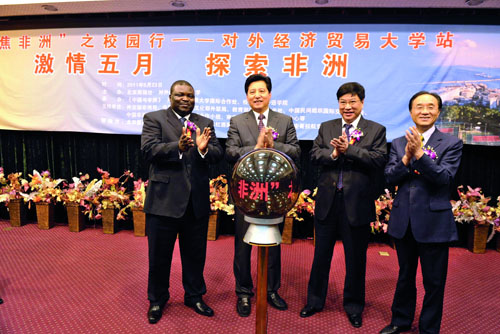|
|

|
|
UIBE President Shi Jianjun (second, right) at the launching ceremony of Focusing on Africa on May 23, 2011 |
On May 23, "Focusing on Africa," an event dedicated to African culture, history and ideas attracted many students at the University of International Business and Economics (UIBE). They attended lectures and art exhibitions along with song and dance performances. African culture has swept through UIBE's campus.
UIBE, founded in 1951, is one of China's most sought-after academic institutions. It offers economics, finance, business, management, law, international trade, international relations, foreign studies and other majors. In September, UIBE celebrated its 60th anniversary. Ambassadors from more than 20 African countries attended the celebration ceremony.
UIBE attaches great importance to its educational cooperation with Africa. African students are one significant part of the foreign student body at the university. There are 91 African students from 38 countries studying at UIBE. Ninety percent are recipients of Chinese Government scholarships.
In June 2010, UIBE's joint "China-Africa Universities 20+20 Cooperation Plan" partnered with Tunis University. The plan's focus was on three major fields: technique export, North African economies, and research on small-and medium-sized enterprises. The two universities also held an international seminar looking at debt problems in developing countries. In the future, student exchange programs and sending teachers to Tunisia will be underway.
Presently, 14,000 full time students attend UIBE, including 2,800 international students from over 130 countries and regions around the world. The university prides itself on its ability to equip students with superior analytical skills, creative thinking and excellent multi-lingual communication skills. Global outlook and awareness are also fostered at the school.
UIBE graduates hold important positions at China's Ministry of Commerce, the Ministry of Foreign Affairs, the Ministry of Education, the General Customs Administration, various banks, accounting firms, law firms, multinational companies and organizations, etc. They also populate top influential enterprises and financial institutions. Commissioned by the government or in cooperation with foreign countries, the university also owns several in-service training institutions for senior business executives.
There are 15 schools at UIBE offering 34 undergraduate programs, 71 masters programs and 35 doctoral programs. While there are 1,500 teachers and administrators on staff, the university also invites over one hundred foreign scholars to teach or research. Among the 32 honorary professors and visiting professors from all over the world, five of them are Nobel laureates.
UIBE is one of the significant research bases for China in the fields of economics, business and law. It is home to more than 60 research institutions that work closely with government and industry. Also at UIBE is the China National Institute of WTO, which is the country's only national-level institution focusing on the World Trade Organization. UIBE's Center for International Business Chinese Communication, also one of a kind in China, strives to link Chinese-for-business teachers and students together. The center works to build students' professional development and offers teaching and learning resources.
In 1989, UIBE founded the first university board of trustees in China. Two former vice premiers served as the first and the second chairmen of UIBE Board. Today, the UIBE Board consists of representatives from the Ministry of Commerce, the Ministry of Education, the Bank of China, the General Customs Administration and the People's Bank of China and entrepreneurs.
UIBE is one of the most internationalized universities in China. It has academic agreements with more than 100 universities in 30 countries. Collaborations include joint education, faculty and student exchange, joint research and joint publication. In addition, UIBE has established Confucius Institutes in the Greece, Japan, Mexico, Russia, the United Kingdom and the United States. The university offers some degree programs in English and they are well received by both Chinese and international students.
|